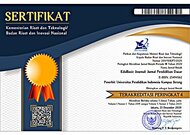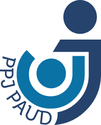Eksplorasi Perilaku Menyontek Di Kalangan Siswa Sekolah Dasar Di Kota Tasikmalaya
Abstract
Keywords
Full Text:
PDFReferences
Abdi, A. P. (2019, May 7). Kemendikbud Catat 126 Kecurangan Selama Ujian Nasional 2019. Tirto. Retrieved from https://tirto.id, May 7 2019.
Albertus, D. K. (2007). Pendidikan Karakter: Strategi Mendidik Anak di Zaman Global. Jakarta: Grasindo. Retrieved from https://google.book
Anderman, E. M., & Murdock, T. B. (2007)., Psychology of Academic Cheating (pp. 1–5). Burlington: Academic Press. https://doi.org/https://doi.org/10.1016/B978-012372541-7/50002-4
Andiwatir, A., & Khakim, A. (2019). Analisis perilaku menyontek dan rancangan perubahannya pada siswa SMP. Intuisi: Jurnal Psikologi Ilmiah, 11(2), 88-97. Retrieved from http://journal.unnes.ac.id/nju/index.php/INTUISI
Cahyo, S. D., & Solicha. (2017). Faktor-faktor yang mempengaruhi perilaku menyontek pada pelajar dan mahasiswa di jakarta. Jurnal JP3I, 6(1), 87–96.
Chasanah, A., & Utomo, C. B. (2019). Internalisasi pendidikan karakter dalam pembelajaran sejarah pada materi pendudukan jepang dan proklamasi kemerdekaan republik indonesia di SMK PGRI 1 Mejobo Kudus tahun pelajaran 2018/2019. Indonesian Journal of History Education, 7(1), 93–102.
https://doi.org/10.15294/ijhe.v7i1.32289
Cizek, G. J. (2003). What do we know about cheating in the classroom? In Detecting and Preventing Classroom Cheating (1st ed., pp. 1–23). North California: University of North Carolina.
Davies, B. (2002). Rethinking Schools And School Leadership For The Twenty First Century : Changes And Challenges. Inaugural Professorial Lecture. Hull: University of Hull.
https://doi.org/10.1108/09513540210432182
Fuchan, A. (1992). Pengantar Metodologi Penelitian Kualitatif. Surabaya: Usaha Nasional.
Hamdani, R. U. (2014). Menyontek..? Yuk!! Hmm.., Nggak Ah!! Jakarta Selatan: Transmedia.
Hartanto, D. (2012). Bimbingan dan Konseling Menyontek: Mengungkap Akar Masalah dan Solusinya. Jakarta: Indeks.
Homiak, M. (2019). Moral Character. Retrieved January 19, 2019, from https://plato.stanford.edu
Kamaruddin, S. A. (2012). Character education and behavior. Journal of Education and Learning, 6(4), 223–230. Retrieved from https://www.neliti.com/id/publications/72829/character-education-and-students-social-behavior
Latorre-Arteaga, S., Gil-González, D., Bascarán, C., Núñez, R. H., Morales, M. del C. P., & Orihuela, G. C. (2016). Dépistage des troubles visuels par des enseignants dans des communautés isolées du Pérou: Recherche sur la mise en oeuvre. Bulletin of the World Health Organization, 94(9), 652–659.
https://doi.org/10.2471/BLT.15.163634
Masada, C., & Dachmiati, S. (2016). Faktor pemengaruh perilaku siswa dan mahasiswa menyontek. Sosio E-Kons, 8(3), 227–233.
Kemendikbud. (2018). Peraturan Menteri Pendidikan dan Kebudayaan Republik Indonesia Nomor 20 Tahun 2018 Tentang Penguatan Pendidikan Karakter pada Satuan Pendidikan Formal, Pub. L. No. 20, 1 (2018). Indonesia. Retrieved from https://jdih.kemdikbud.go.id
Kemendiknas. (2003). Undang-Undang Republik Indonesia nomor 20 Tahun 2003 tentang Sistem Pendidikan Nasional, Pub. L. No. 20, 6 (2003). Indonesia: Riset Teknologi dan Pendidikan Tinggi. https://doi.org/10.16309/j.cnki.issn.1007-1776.2003.03.004
Knoetze, J. S. (2012). An Emotional Awareness Program For Children In Middle Childhood, For Utilization In The Educational System. Doctoral Dissertation. University Of Prethoria. Retrieved from https://repository.up.ac.za
Nursalam. (2012). Intensitas Copying Answer Pada Tes Kemampuan Matematika. Lentera Pendidikan, 15, (1), 32-40. https://doi.org/https://doi.org/10.24252/lp.2012v15n1a3
Revell, L., & Arthur, J. (2007). Character education in schools and the education of teachers. Journal of Moral Education, 36(1), 79–92. https://doi.org/10.1080/03057240701194738
Riadi, M. (2013). Teori Menyontek. Retrieved February 1, 2020, from https://www.kajianpustaka.com
Sugiyono. (2015). Metode Penelitian Pendidikan: Pendekatan Kuantitatif, Kualitatif, dan R&D. Bandung: Alfabeta.
Sugiyono. (2018). Metode Penelitian Kuantitatif, Kualitatif, dan R&D. Bandung: Alfabeta.
DOI: https://doi.org/10.17509/ebj.v2i1.26426
Refbacks
- There are currently no refbacks.
Copyright (c) 2020 Universitas Pendidikan Indonesia
This work is licensed under a Creative Commons Attribution 4.0 International License.
This journal is indexed by




.png)




.png)
1.png)


1.png)

.png)